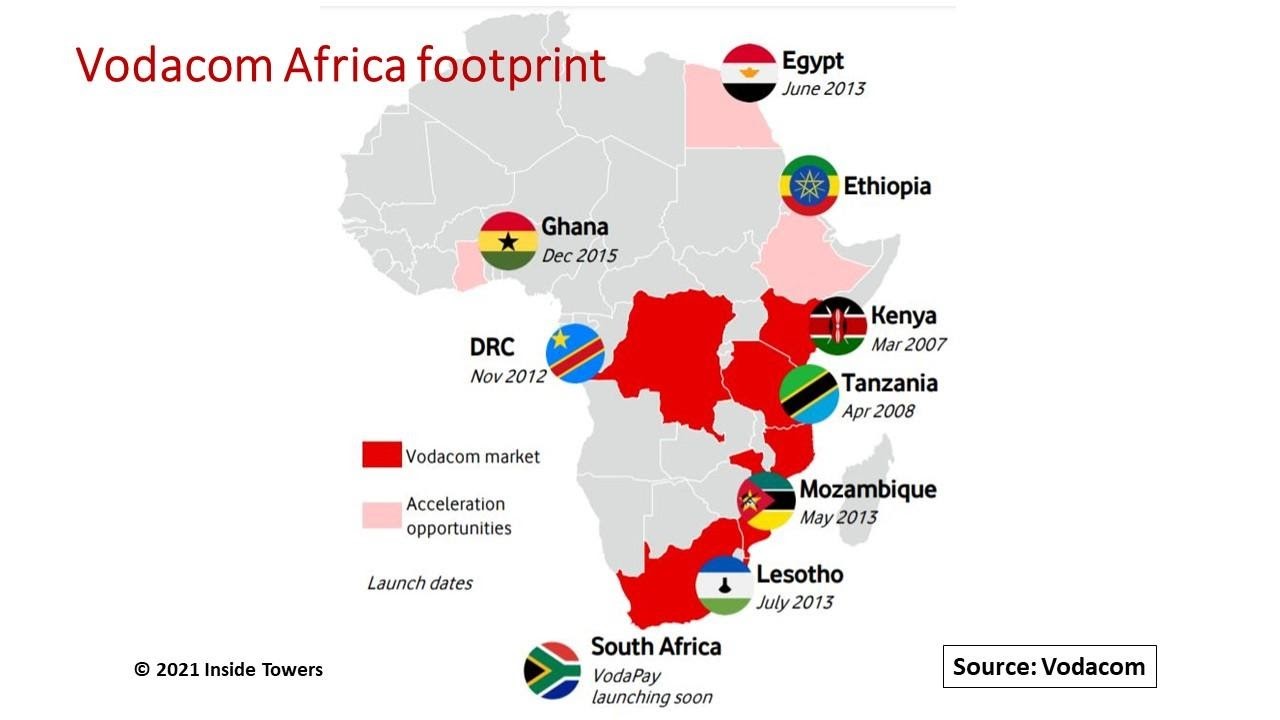Vodacom Group, a subsidiary of U.K.-based Vodafone Group, is Africa’s largest financial technology (fintech) operator. Vodacom’s markets cover over 400 million people with South Africa as its largest contributor, representing 74 percent of its FY21 operating profit. The company has leading market share positions in DRC, Tanzania, Mozambique, Lesotho, in Kenya through a 35 percent ownership in telecom operator Safaricom and increasingly in Egypt, Ethiopia and Ghana where Vodafone operates.
In a recent Investor Day presentation, Vodacom said it is amplifying its core mobile business with new financial and digital services, IoT and fiber. It considers financial services as a strategic differentiator.
Iconic M-pesa
Vodacom launched its popular M-pesa mobile financial service in 2007, and now is Africa’s leading fintech player, by revenues and transaction values. With the addition of Egypt and Ghana markets along with 13-14 million fintech customers in South Africa, Vodacom counts close to 64 million financial services customers across Africa.
The company claims 500,000 M-pesa agents across its footprint, making the service widely available and an important enabler of meaningful financial inclusion. In the past year, M-pesa facilitated 15 million first time borrowers and lowered barriers to inclusion through nano products that average $4 per ticket. Vodacom says it facilitates millions of transactions a day with loan denominations of “less than a few dollars at a time.” This is an important capability since most of Vodacom’s customers earn and spend on a day-to-day basis.
A ubiquitous agent network, low transaction costs, and a simple and secure user interface are driving continued user and transaction growth.
Money transfers (cash in/cash out, peer-to-peer payments) make up almost 80 percent of the M-pesa revenue base. Digital payments and new financial services such as micro loans make up the balance. Vodacom earns a fee on each transaction linked to the transaction value.
The company’s Q1FY22 results showed M-pesa transaction volumes reached $25 billion per month, up 64 percent year-over-year and annualized at $300 billion. By comparison, U.S.-based payments company Square handles $170 billion in annual transaction volume. M-pesa contributes 28 percent of Vodacom service revenue from international money transfers, loans, and savings, with upside expected from advanced services such as microfinance and insurance.
A new Ericsson research report titled Mobile Financial Services on the Rise shows that nearly half of all consumers in sub-Saharan Africa– up 300 percent in the last six years – currently use some form of mobile financial services. Survey respondents indicate faster transactions as the key factor for increased mobile money services use in future.
In the next several years, Vodacom expects fintech usage to penetrate over 60 percent of its existing mobile accounts and new accounts in Ethiopia and Egypt, each with populations over 100 million. Importantly, Vodacom’s fintech services support financial inclusion and key United Nations’ Sustainable Development goals.
Super App
Vodacom has developed a comprehensive suite of financial products in a “super-app” for both consumers and merchants. Merchants can utilize an enterprise resourcing tool called VodaTrade that today facilitates $13 billion in annual transactions between merchants and packaged-goods suppliers.
To collect payments, Vodacom offers its own Android-powered physical point-of-sale devices in South Africa that complement existing M-pesa till services. Dubbed Vodapay in South Africa and branded as M-pesa in other markets, super-app services include loans and savings, international money transfers, seamless QR, person-to-person payments, entertainment, and personalized shopping.
Existing financial service businesses, mainly payment transfers, are volume based and feature phone orientated. With the super-app, digitalized fintech services are geared towards smartphone users. The super-app removes physical limitations and expands beyond geographical boundaries. Vodacom now can aggregate a digital shopping mall experience with entertainment and broader money transfers, lending, and savings.
Vodacom compounds revenue opportunities by combining services. For example, an e-commerce transaction generates merchant listing and payment fees, and commissions on consumer loan origination where credit is provided.
Shameel Joosub, Vodacom CEO emphasizes, “Delivering on these targets will support our core purpose which is to connect customers for a better future. Financial Services is integral to our purpose-led business model, our commitment to improving lives, and is a clear strategic differentiator.”
Strategic Vision
From 57.7 million customers in March 2021, Vodacom is targeting 72.6 million financial service customers by 2024.
Vodacom sees fintech revenues accelerating at a 20 percent CAGR over the medium term. Fintech’s contribution to consolidated mobile service revenue is expected to increase from about 17 percent today to 25-30 percent by 2024 and over 30 percent by 2026.
By John Celentano, Inside Towers Business Editor





Reader Interactions